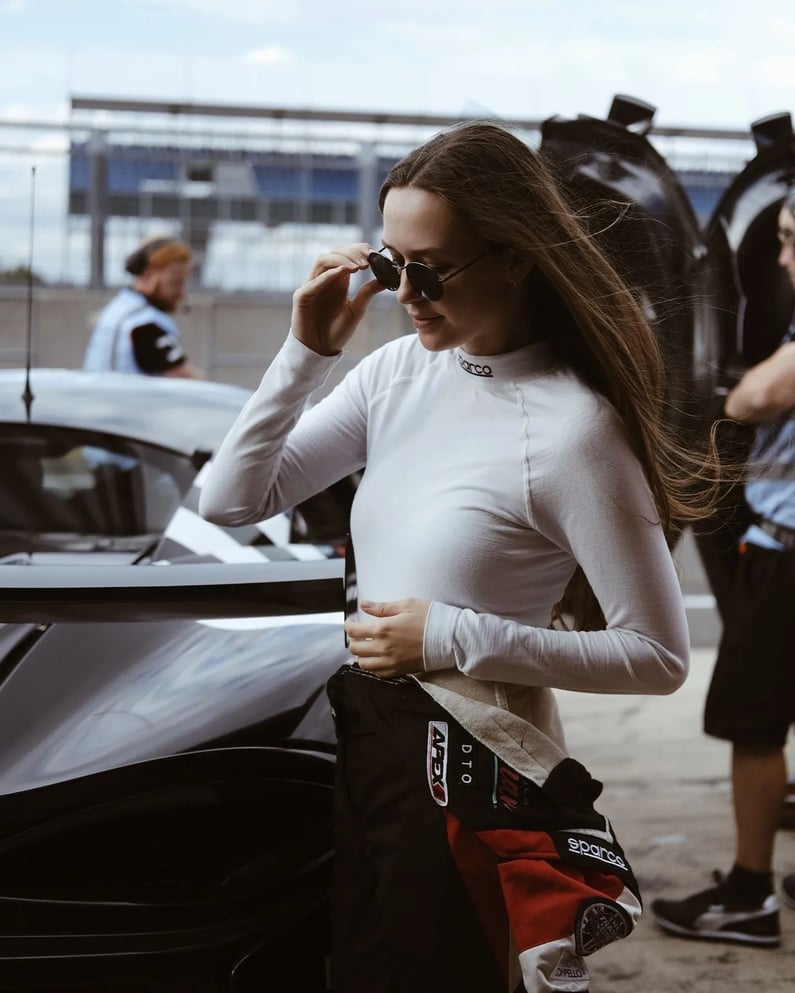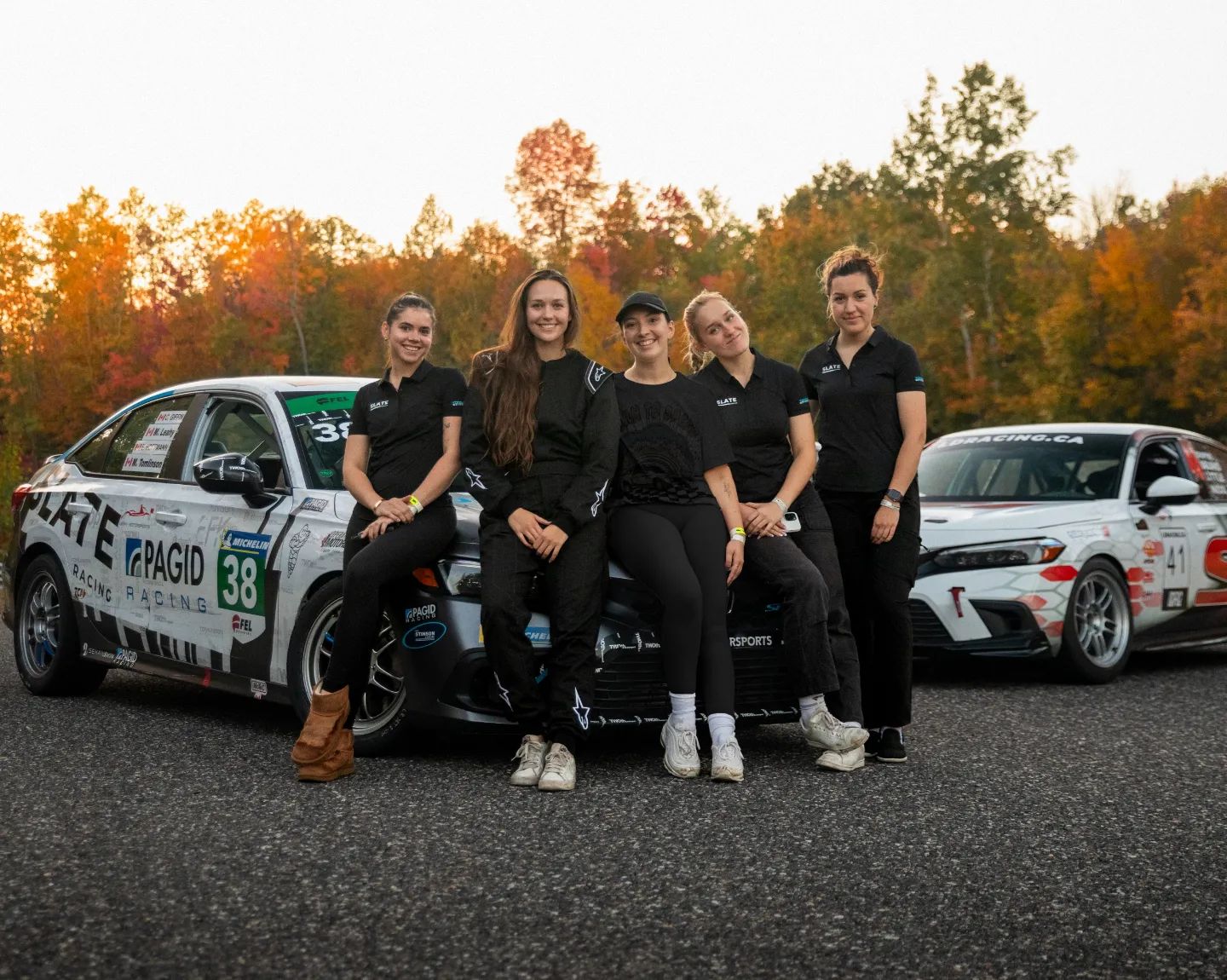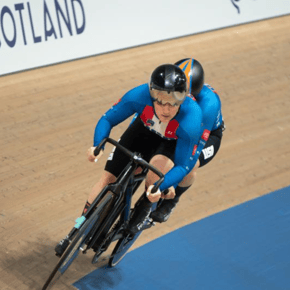
Source: Erika Hoffmann
When you ask the banal question of “what do you do for work?” you never expect to hear “I’m a racecar driver,” but that’s exactly the answer Erika Hoffmann gives. Well, most of the time. When she’s feeling chatty. There are inevitable follow up questions when you give that kind of answer. Erika is warm and smart and talented, and much of that comes across within the first moments of meeting her, but most people never get to know the other side of Erika: the competitor, the hustler, the trailblazer and the game changer.
Erika had an unconventional start to her driving career. The majority of drivers start in go-karting, small cars that can be driven without a driver’s license, where they start to build the skills and instincts needed to drive professionally. But just one season of karting will set you back tens of thousands of dollars and Erika’s parents kindly told her “absolutely not.” Erika dove into every other sport she could find, but was counting down the years until she could get behind the wheel. When she finally got her license, she rolled up to her racing debut in her family Hyundai Accent, ready to test herself in a local autocross race. Autocross is a very grassroots type of racing: cones are set up in a parking lot or large tarmac area, demarcating a homemade lap.
Erika remembers riding with an instructor who showed her a test lap: she beat his time. Erika said she had an immediate connection with car racing. She said she could feel the car doing what it was capable of, and she loved the feeling of pushing it towards that edge. She intuitively knew how to correct, when to push and when to pull back.
From there, she went to her local race track, Calabogie, eager to keep learning and chasing that feeling of becoming one with the car.
Erika was the only girl at her track, and everyone always assumed she was there with her dad, or brother.
Undeterred, Erika qualified for the local series and missed the season championship win by only one point. She walked away with the Ottawa Sports Car Club Rookie of the Year award, and a hunger for more. More arrived in the form of the Formula Woman competition, towards the end of 2021. The grand prize of the contest, which would include many rounds, countless drives and all sorts of testing, was the opportunity to race the team’s GT4 McLaren in Europe.
Erika won the competition, the first North American woman ever to do so, crowning her the queen of 1000 drivers from all over the world.
In some ways Erika arrived at that moment: she was seated in a McLaren GT4, racing professionally in Europe, being invited onto podcasts and finally recognized for the talent she’d felt in her fingers during that first race in the parking lot. On the other, Erika was still a young woman in car racing, and her future was anything but certain.
.jpg?width=1440&height=1798&name=340334553_3091191057692362_8604260901103225227_n%20(1).jpg)
Source: Erika Hoffmann
It’s hard to overstate what a male-dominated industry sportscar racing is. There have been multiple studies that have proven that female athletes are equally capable behind the wheel: physically and psychologically.
This isn’t weightlifting: this is a sport that’s uniquely positioned for equality between male and female athletes, but the reality couldn’t be farther from reality.
Only 10% of racers across all categories are women, and only 13% of go-karters, where most drivers develop their skills. There are also extremely few women in any of the other roles that support driving, of which there are many.
I asked Erika why having women in motorsports is important to her. She, of course, wants girls and women to have the same opportunities that she’s had. To feel the thrill of their first pass in a race, to gain that confidence that comes with speed and power. She also knows that it will make the sport better. She joked, “I’ve been at race weekends when someone forgets the food.” We share a knowing laugh: we know that we would never forget snacks.
But in all seriousness, who wants to run a business with the same viewpoints being shared over and over? Who seriously would think to run an entire industry that way? By excluding women from every position in the car racing industry, the industry itself suffers. It’s missing out on innovations it can’t even imagine.
In addition to the explicit gender barriers, Erika spoke about the more subtle burdens of being a woman in car racing. When she was starting out, everyone would tell her “well it helps that you’re so pretty.” She shared that she felt ungrateful thinking of this comment negatively: who doesn’t want to be pretty? But hearing it again and again reinforced an idea that she wouldn’t succeed because of her skill, but rather because she looked a certain way. She started to hate hearing it, and its constant presence on the lips of people she knew unsettled her.
She also spoke about the pressures of being an “only” in any space. She, along with other women in the car racing world, shoulder a “burden of excellence.” If they are “lucky” enough to earn a seat at the table then they had better not make a single mistake. Making a misstep would give the doubters ammunition to insist that women don’t belong.
.jpg?width=1440&height=1800&name=399085476_892882052355132_3252191958092165041_n%20(1).jpg)
Source: Erika Hoffmann
Erika wanted to do things differently, which is how Slate Racing was born. She, along with her co-founders, wanted to create a supportive environment for women within the car racing world: one that would allow them the grace to make mistakes, and learn on a team that wanted them to succeed.
The traditional table didn’t have enough seats for women at it, so Slate Racing is building a new table. A racing team that’s explicitly created to support women: the first of its kind in Canada.
 Source: Slate Racing
Source: Slate Racing
It will be a place to develop racers, yes, but also to create connections and network, to ask questions and gain confidence.
So now Erika is continuing to grow her own racing career, while at the same time making sure all future girls and women in car racing will have the support they deserve. She is working on financing both her own career and Slate Racing, running social media, organizing teammates, negotiating contracts and scheduling interviews and race calendars. She shared a little bit about the struggle of balancing everything. She said, “sometimes an opportunity will come up for me, and I’m like that would be so perfect for Slate!” But she also recognizes that her personal success will buoy Slate’s profile. She joked, “It’s kind of like putting on your own oxygen mask before helping others.” To me, it seems like a pioneering career in motorsports should come with an oxygen mask included. When Erika comes up for air, there’s just enough time for a big gulp before she’s on to the next thing.
 Source: TGF Media INC.
Source: TGF Media INC.
If reading Erika’s story has you itching to slam your foot on your Prius’ pedal, she says to get in touch with your local track. Don’t be afraid to jump right in: it doesn’t matter what kind of car you drive, just as long as you’re willing to be brave and learn a little. She also encourages girls and women to check out Shift Up Now, an organization that walks the walk of supporting women and girls in motorsports. You can also follow Erika’s journey on Instagram, check out her website and follow Slate Racing as it takes the motorsports world by storm. Signing off now so I can go drive my Subaru a little faster than I should down the highway, and imagine I’m in the seat of a McLaren.
About Parity
Minority-founded in 2020, Parity's mission is to close the gender income and opportunity gap in professional sports. By developing high-impact collaborations between brands, professional women athletes and their fans, Parity has proudly put more than $3.5 million in the pockets of women athletes, attracting dozens of brands to the movement in the process. The platform offers connections to more than 1000 women athletes from 80+ sports, including well over 200 Olympians and Paralympians. For more information on how to tap into the rapidly rising influence and popularity of women athletes, visit https://paritynow.co or follow us on Instagram, LinkedIn, Facebook, X (formerly Twitter) and Threads.




